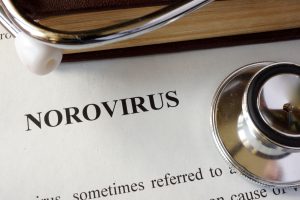 Norovirus is a group of viruses that cause severe vomiting and diarrhea. It is very common and highly contagious. About 685 million cases are reported globally each year. Of those cases, over 200 million affect children.
Norovirus is a group of viruses that cause severe vomiting and diarrhea. It is very common and highly contagious. About 685 million cases are reported globally each year. Of those cases, over 200 million affect children.
Norovirus outbreaks occur most often between November and April in countries above the equator and between April and September in countries below the equator.
There are several symptoms of norovirus, including:
- Nausea
- Stomach pain
- Headache
- Fever
- Body aches
Symptoms usually appear 12 to 48 hours after exposure and last one to three days. Norovirus symptoms are generally the same in adults and children, but adults may experience more diarrhea than children and children may vomit more than adults.
A virus in the Caliciviridae family causes norovirus. When the virus enters your body, it causes your stomach and intestines to swell or become inflamed. This is called gastroenteritis, which leads to norovirus symptoms.
There are many ways to contract norovirus, including:
- Through close contact with someone who has the virus
- Touching contaminated surfaces and then touching your mouth or nose
- Eating or drinking contaminated foods or beverages
Norovirus is the biggest cause of illness from contaminated food in the U.S. The virus typically spreads when someone who has the virus touches food before serving it to someone else. Sometimes, certain foods such as oysters and other seafood are naturally contaminated with norovirus.
Anyone can get infected by norovirus. Factors that put you at risk for norovirus include:
- Coming in contact with someone who has the virus
- Having genes that make you more likely to develop symptoms
A healthcare provider will diagnose norovirus after learning about your symptoms. Testing isn’t usually necessary, but a healthcare provider may ask for a stool sample to confirm your diagnosis. Testing will be done if you have an underlying medical condition that affects the performance of your immune system and your ability to fight infections.
There isn’t a cure for norovirus. Treatment for the infection focuses on relieving symptoms, which will go away in one to three days. You can manage the symptoms of norovirus by:
- Drinking plenty of fluids, especially those rich in electrolytes
- Getting a lot of rest
- Eating soft, bland foods
There are many precautions you can take to reduce the risk of getting norovirus, including:
- Washing your hands often with soap and water
- Washing fruits and vegetables before eating them
- Cooking your food thoroughly (especially seafood or shellfish) or to an appropriate temperature
- Avoiding contact with people who are infected with norovirus
- Cleaning and sanitizing frequently touched objects and surfaces
- Washing your clothes thoroughly, especially if they are soiled
Please note that using hand sanitizer doesn’t kill norovirus particles as effectively as washing your hands with soap and water. If you are infected with norovirus, you shouldn’t prepare food or care for others, as you can spread the infection.
If you experience vomiting, diarrhea, or other symptoms of norovirus, schedule an appointment with a doctor at Flushing Hospital Medical Center’s Ambulatory Care Center as soon as possible by calling (718) 670-5486.
All content of this newsletter is intended for general information purposes only and is not intended or implied to be a substitute for professional medical advice, diagnosis or treatment. Please consult a medical professional before adopting any of the suggestions on this page. You must never disregard professional medical advice or delay seeking medical treatment based upon any content of this newsletter. PROMPTLY CONSULT YOUR PHYSICIAN OR CALL 911 IF YOU BELIEVE YOU HAVE A MEDICAL EMERGENCY.
